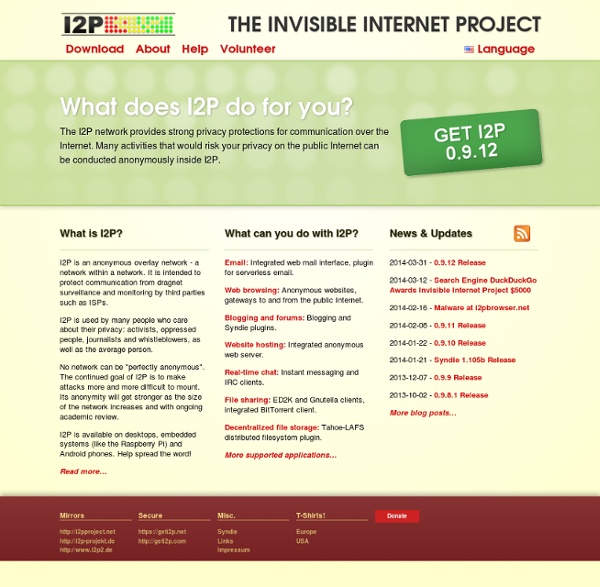



The Freenet Project - /index Privatize Phantom - System for generic, decentralized, unstoppable internet anonymity The Phantom protocol is a system for decentralized anonymization of generic network traffic. It has been designed with the following main goals in mind: 1. Completely decentralized. - No critical or weak points to attack or put (il)legal pressure on. 2. - Direct technical destructive attacks will practically be the only possible way to even attempt to stop it. 3. - Probabilistic methods (contrary to deterministic methods) must be used in a completely decentralized design like this, where no other peer can be trusted, so focus is put on optimizing these methods. 4. - This is simple in itself, but still important in the context of anonymization. 5. - No one should have to worry about crimes being perpetrated from their own IP address. 6. - You never know what the next draconian law might be. 7. - Most existing anonymization solutions are practically unusable for (or even prohibit) larger data volumes. 8. The latest version of the source release package can always be downloaded here.
Fresh Web Proxy List - Proxy Server How to stop DNS leakage while using a VPN | Privacy Lover The DNS leakage problem explained Whenever you type a domain name, your Internet browser contacts a DNS server and makes a DNS Query. Most Virtual Private Network providers fail to mention that while your connexion is encrypted using a VPN there is a high chance that a DNS leak will occur and your ISP will still be able to see what you are doing over the internet. The problem occurs primarily when routers and computers are set to use automatic DHCP, this can force name lookups to bypass the name server supplied by the active VPN connection and instead use the one supplied by your ISP which allows them to see the websites you visit. DNS leak test If you want to check if you suffer from DNS leakage, connect to your usual VPN/proxy and visit After you click on Test my DNS you should ignore everything and look only on top of the page where it says DNS Resolver(s) tested. Solving DNS leakage List of free public DNS providers: Comodo public DNS Google public DNS
PROXY||ProxyWeb.Com.es - PROXY WEB 50 Excellent Adobe After Effect Tutorials Adobe After Effects is a digital motion graphics and compositing software. Its main purpose is for film and video post-production. With Adobe After Effects it’s possible to create so great looking visual effects as in “Hollywood style” movies. Adobe After Effects is mainly used to create visual effects for commercials and movies but you can also create image slide-shows, some small videos, transition effects for websites and stuff like that. It is not difficult to learn by your own. You only need to find some good tutorials and you are ready to start. For beginners Introduction to Adobe After Effects | Andrew Kramer Basic effects | Andrew KramerLearn to create some basic effects using After Effects. Animation | Andrew KramerNow you can learn how to create an animation. Trim Paths | Aharon RabinowitzLearn how to create simple trim paths. Simple Reflection Techniques | Aharon RabinowitzVery simple but cool technique creating reflections. Rendering | Shoaib KhanLearn about rendering your video.
Virtual-Browser 42 Free Online Magazines for Designers Art and design magazines are designers close companion. Not only it feeds us with latest trends and news in the design industry, it’s also a good source of inspiration, particularly useful for those who hit the design block frequently. Just in case you weren’t aware, there’s a huge pool of free magazines on the net related to the design field; we meant those softcopy magazines you can either browse online or download (.PDF, .SWF) for offline viewing. Not only they have high quality content, each issue released is also free. Eye Magazine A very artistic and well-curated magazine, Eye has everything that a professional designer or a design student looks forward in a graphic design journal. Additionally, Eye Magazine informs you about the ongoing and upcoming events like design summits, workshops, exhibitions and talk sessions related to the graphic design and visual culture taking place all over the world. Frequency: Quarterly Idea Magazine Slanted Frequency: Biannually Creative Review net